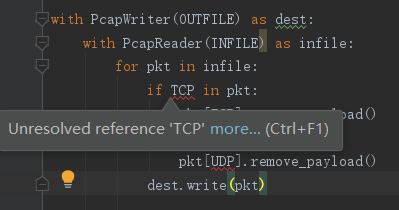Created
July 26, 2017 15:16
-
-
Save alem0lars/ca034b0644cf2512cbfb8a03b3388111 to your computer and use it in GitHub Desktop.
Remove payload from a pcap (useful to fully anonymize a pcap)
This file contains hidden or bidirectional Unicode text that may be interpreted or compiled differently than what appears below. To review, open the file in an editor that reveals hidden Unicode characters.
Learn more about bidirectional Unicode characters
| #! /usr/bin/env python2 | |
| from scapy.all import * | |
| import sys | |
| INFILE = sys.argv[1] | |
| OUTFILE = sys.argv[2] | |
| with PcapWriter(OUTFILE) as dest: | |
| with PcapReader(INFILE) as infile: | |
| for pkt in infile: | |
| if TCP in pkt: | |
| pkt[TCP].remove_payload() | |
| elif UDP in pkt: | |
| pkt[UDP].remove_payload() | |
| dest.write(pkt) |
This should work (python3):
#! /usr/bin/env python3
from scapy.utils import rdpcap, wrpcap
from scapy.layers.inet import IP, TCP, UDP # import needed!
import sys
INFILE = sys.argv[1]
OUTFILE = sys.argv[2]
packets = rdpcap(INFILE)
new_packets = []
for packet in packets:
if packet.haslayer("IP"):
if packet.haslayer("TCP"):
packet["IP"]["TCP"].remove_payload()
elif packet.haslayer("UDP"):
packet["IP"]["UDP"].remove_payload()
new_packets.append(packet)
wrpcap(OUTFILE, new_packets)
Would it be possible to do such postprocessing on the fly?
#!/usr/bin/env python3
from scapy.all import *
from scapy.layers.inet import *
import sys
with PcapWriter(sys.argv[2]) as out:
with PcapReader(sys.argv[1]) as in:
for pkt in in:
if TCP in pkt: pkt[TCP].remove_payload()
elif UDP in pkt: pkt[UDP].remove_payload()
out.write(pkt)
Sign up for free
to join this conversation on GitHub.
Already have an account?
Sign in to comment
I apply it in python3. But it cannot reference to TCP and UDP. What's wrong?Could you give me some advice?
